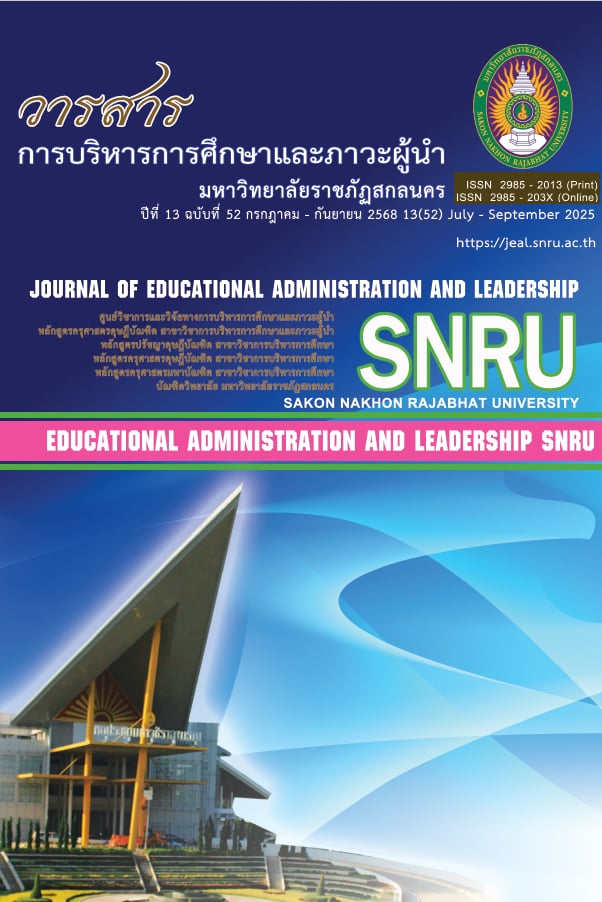

ทักษะการสื่อสารของผู้บริหารยุคใหม่ที่ส่งผลต่อประสิทธิผลการปฏิบัติงานของครูในโรงเรียน สังกัดสำนักงานเขตพื้นที่การศึกษาประถมศึกษาบึงกาฬ
Communication Skills of Modem Age Administrators Affecting Teacher’s Performance Effectiveness In Schools Under Buengkan Primary Educational Service Area Office
ผู้แต่ง
นิพนธ์ เสนาพันธ์, จินดา ลาโพธิ์, ประภัสร สุภาสอน
Author
Nipon Senapun, Jinda lapho, Praphat Suphason
บทคัดย่อ
การวิจัยครั้งนี้มีความมุ่งหมายเพื่อศึกษา เปรียบเทียบ หาความสัมพันธ์ หาอำนาจพยากรณ์ และหาแนวทางการพัฒนาทักษะการสื่อสารของผู้บริหารยุคใหม่ ที่ส่งผลต่อประสิทธิผลการปฏิบัติงานของครู ในโรงเรียนสังกัดสำนักงานเขตพื้นที่การศึกษาประถมศึกษาบึงกาฬ กลุ่มตัวอย่าง ได้แก่ ผู้บริหารสถานศึกษา และครูผู้สอน ปีการศึกษา 2567 จำนวน 348 คน จำแนกเป็นผู้บริหารสถานศึกษา 87 คน และครูผู้สอน 261 คน เครื่องมือที่ใช้ เป็นแบบสอบถามแบบมาตราส่วนประมาณค่า 5 ระดับ ประกอบด้วย แบบสอบถามเกี่ยวกับทักษะการสื่อสารของผู้บริหารยุคใหม่ มีค่าอำนาจจำแนกอยู่ระหว่าง 0.646 - 0.852 และมีค่าความเชื่อมั่น เท่ากับ 0.879 และแบบสอบถามเกี่ยวกับประสิทธิผลการปฏิบัติงานของครู มีค่าอำนาจจำแนกอยู่ระหว่าง 0.648 - 0.707 และมีค่าความเชื่อมั่น เท่ากับ 0.820 และแบบสัมภาษณ์แนวทางการพัฒนา สถิติที่ใช้ในการวิเคราะห์ข้อมูล ได้แก่ ความถี่ ร้อยละ ค่าเฉลี่ย ส่วนเบี่ยงเบนมาตรฐาน การวิเคราะห์ความแปรปรวนทางเดียว ค่าสัมประสิทธิสหสัมพันธ์แบบเพียร์สัน และการวิเคราะห์การถดถอยพหุคูณแต่ละขั้นตอน
ผลการวิจัยพบว่า
1. ทักษะการสื่อสารของผู้บริหารยุคใหม่ โดยรวมอยู่ในระดับมากที่สุด
2. ประสิทธิผลการปฏิบัติงานของครู โดยรวมอยู่ในระดับมากที่สุด
3. ทักษะการสื่อสารของผู้บริหารยุคใหม่ จำแนกตามสถานภาพการดำรง ตำแหน่ง และประสบการณ์ในการปฏิบัติงาน พบว่า โดยรวมและรายด้านแตกต่างกัน อย่างมีนัยสำคัญทางสถิติที่ระดับ 0.01 ส่วนจำแนกตามขนาดโรงเรียน พบว่า โดยรวมมีความแตกต่างกันอย่างมีนัยสำคัญทางสถิติ ที่ระดับ 0.01
4. ประสิทธิผลการปฏิบัติงานของครู จำแนกตามจำแนกตามสภาพการดำรงตำแหน่ง พบว่า โดยรวมแตกต่างกันอย่างมีนัยสำคัญทางสถิติที่ระดับ 0.05 จำแนกตามขนาดของโรงเรียน พบว่า โดยรวมแตกต่างกันอย่างมีนัยสำคัญทางสถิติที่ระดับ 0.01
5. ทักษะการสื่อสารของผู้บริหารยุคใหม่และประสิทธิผลการปฏิบัติงานของครู มีความสัมพันธ์กันทางบวก อย่างมีนัยสำคัญทางสถิติที่ระดับ 0.01 โดยมีความสัมพันธ์ระดับปานกลาง เท่ากับ 0.317
6. ทักษะการสื่อสารของผู้บริหารยุคใหม่ที่สามารถพยากรณ์ประสิทธิผลการปฏิบัติงานของครู อย่างมีนัยสำคัญทางสถิติที่ระดับ 0.01 จำนวน 2 ด้าน ได้แก่ ด้านความชัดเจนในการสื่อสาร และด้านอวัจนภาษาที่จำเป็นสำหรับผู้บริหารยุคใหม่ โดยสามารถร่วมกันพยากรณ์ได้ร้อยละ 9.50 และมีความคลาดเคลื่อนมาตรฐานของการพยากรณ์ เท่ากับ ±0.17892
7. แนวทางการพัฒนาทักษะการสื่อสารของผู้บริหารยุคใหม่ที่ส่งผลต่อประสิทธิผลการปฏิบัติงานของครู ได้แก่ ด้านความชัดเจนในการสื่อสาร ผู้บริหารยุคใหม่ควรฝึกฝนการสื่อสารโดยการใช้ภาษาที่กระชับ กะทัดรัดได้ใจความ และด้านอวัจนภาษาที่จำเป็นสำหรับผู้บริหารยุคใหม่ ผู้บริหารยุคใหม่ควรฝึกการใช้น้ำเสียงและกิริยาท่าทางในการสื่อสารที่สุภาพ ฝึกฝนในการแสดงออกที่สอดคล้องระหว่างอวัจนภาษาและวัจนภาษา
Abstract
This research aims to study, compare, analyze relationships, predict, and develop guidelines for improving the communication skills of modern administrators that impact the work efficiency of teachers in schools under the Bueng Kan Primary Educational Service Area Office. The sample group consisted of school administrators and teachers working in schools under the Bueng Kan Primary Educational Service Area Office in the academic year 2024, totaling 348 participants, including 87 school administrators and 261 teachers. The sample size was determined using Krejcie and Morgan’s table and selected through multi - stage random sampling. The research instruments included questionnaires and interviews. The questionnaires were based on a five - point Likert scale. The questionnaire on modern administrators' communication skills had a discrimination power ranging from 0.646 to 0.852 and a reliability coefficient of 0.879. The questionnaire on teachers’ work efficiency had a discrimination power ranging from 0.648 to 0.707 and a reliability coefficient of 0.820 Data analysis was performed using frequency, percentage, mean, standard deviation, One - Way ANOVA, Scheffe’s post hoc test, Pearson’s Product - Moment Correlation Coefficient, and Stepwise Multiple Regression Analysis.
The research results found that
1. The overall communication skills of modern administrators were at the highest level.
2. The overall work efficiency of teachers was at the highest level.
3. Communication skills of modern administrators, classified by position and work experience, showed statistically significant differences at the 0.01 level. When classified by school size, significant differences were also found at the 0.01 level.
4. Teachers' work efficiency, classified by position, showed statistically significant differences at the 0.05 level. When classified by school size, significant differences were found at the 0.01 level.
5. There was a moderate positive correlation (0.317) between the communication skills of modern administrators and teachers’ work efficiency, with statistical significance at the 0.01 level.
6. Two aspects of modern administrators’ communication skills - clarity in communication and non -verbal communication - significantly predicted teachers’ work efficiency at the 0.01 level. These two aspects collectively accounted for 9.50% of the variance, with a standard error of prediction of ±0.17892.
7. Guidelines for improving modern administrators’ communication skills to enhance teachers’ work efficiency include: Clarity in Communication: Administrators should regularly practice using concise, clear, and straightforward language, avoid ambiguous expressions, and minimize the use of complex or technical terms. Non - Verbal Communication: Administrators should refine their tone of voice and body language to be polite and professional, ensure consistency between verbal and non - verbal communication, and seek training in non - verbal communication whenever possible.
คำสำคัญ
ทักษะการสื่อสารของผู้บริหารยุคใหม่, ประสิทธิผลการปฏิบัติงานของครูKeyword
Modern Administrators’ Communication Skills, Teachers’ Work EfficiencyNotice: Undefined variable: dataSet in /var/www/html/ArticleView.php on line 116
Notice: Trying to access array offset on value of type null in /var/www/html/ArticleView.php on line 116
บทความทุกบทความเป็นลิขสิทธิ์ของ
Notice: Undefined variable: dataSet in /var/www/html/ArticleView.php on line 116
Notice: Trying to access array offset on value of type null in /var/www/html/ArticleView.php on line 116
เท่านั้น
กำลังออนไลน์: 5
วันนี้: 725
เมื่อวานนี้: 931
จำนวนครั้งการเข้าชม: 1,208,471
อาคารบัณฑิตวิทยาลัย ชั้น 2 ตำบลธาตุเชิงชุม อำเภอเมือง จังหวัดสกลนคร 47000
โทร/
แฟกซ์ 0-4297-0093
บรรณาธิการ: รองศาสตราจารย์ ดร.ไชยา ภาวะบุตร
ติดต่อ/สอบถาม: นายธีรเวทย์ เพียรธัญญกรณ์
โทร: 0-4297-0093